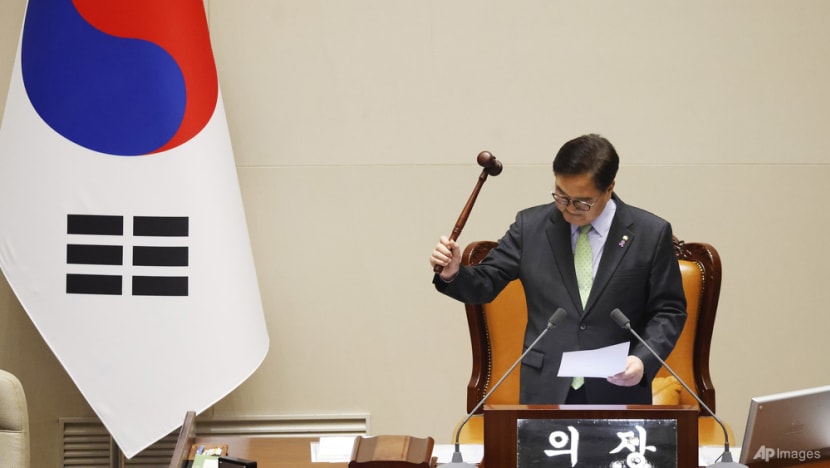Commentary: The end of South Korea's Yoon's presidency is nigh
If South Korean President Yoon Suk Yeol’s presidency somehow manages to survive, the country will likely be paralysed for months, even years, says political science professor Robert Kelly.

Protesters attend a rally demanding South Korean President Yoon Suk Yeol's impeachment, in front of the National Assembly in Seoul, South Korea, on Dec 7, 2024. The signs read, "Impeach Yoon Suk Yeol." (AP Photo/Ahn Young-joon)

This audio is generated by an AI tool.
BUSAN, South Korea: After a week of political twists and turns, South Korean President Yoon Suk Yeol survived an impeachment attempt on Saturday (Dec 7), triggered by his controversial and brief push to impose martial law.
The South Korean legislature, the National Assembly, failed to impeach Mr Yoon after all but three members of his People Power Party (PPP) boycotted the vote.
The PPP walked out of the legislature when the impeachment vote arose. Mr Yoon’s opponents hold 192 out of 300 National Assembly seats. Impeachment requires 200 votes. So Mr Yoon survived.
But the opposition is now pledging an impeachment vote every week until it passes, backed up by relentless street protests despite freezing winter temperatures. The liberal opposition needs only eight PPP defectors to pass impeachment. If the street protests continue and the country is politically paralysed, it is hard to imagine that eight votes would not come over eventually.
Indeed, the PPP boycotted the impeachment – rather than vote against it – because it could not guarantee against defection by some of its members. That is a strong sign that in a full legislative vote, Mr Yoon would lose.
A MASSIVE POPULAR REJECTION OF YOON
Mr Yoon had briefly declared martial law earlier in the week. This was hugely controversial, as there was no underlying national emergency. Instead, Mr Yoon appears to have done this out of frustration over the opposition-controlled National Assembly which has relentlessly battled his administration.
While there is some legitimacy to Mr Yoon’s grievances of gridlock and excessive partisan conflict, martial law was a shockingly disproportionate response.
Divided government – where one party controls the legislature and another controls the executive – is common in democracies. The normal response is to muddle through with moderate, centrist governance. Hence, Mr Yoon’s move was widely interpreted as a power grab or even a coup. He was forced to pull back just a few hours later.
But the damage was done. Mr Yoon is now widely seen as a threat to South Korean democracy. His decision to deploy the military at the National Assembly was particularly shocking to South Korean sensibilities.
South Koreans fought for democracy against military dictators in the 1970s and 80s. Those memories are still fresh. Activists and street fighters from those days are still alive.
Indeed, Mr Yoon, who is 63, lived through this struggle period. It is remarkable that he apparently thought he could deploy the military onto South Korea’s streets again without provoking a massive national backlash.
That backlash came, and it was swift. There is now enormous public pressure on Mr Yoon to resign. South Korea has a vibrant street protest culture; it is widely expected that the protests will continue until he either resigns or is impeached. It is hard to imagine the public calming down enough to permit Mr Yoon to complete his full presidential term, which ends in May 2027.
THE ENDGAME FOR YOON
There are several endgame scenarios now, most of them turning on how Mr Yoon’s legislative allies respond to the mounting political pressure.
First, he might hang on by effectively turning over his presidency to his legislative partners. Mr Yoon gave a brief speech several hours before the vote on Saturday offering just that. He offered to allow his allied political party in the National Assembly – the conservative PPP – to set policy in his stead.
This is likely bait to keep PPP legislators from voting for his removal. If they think they will run the country, with Mr Yoon relegated to a curious caretaker role, perhaps they will retain him. Mr Yoon is probably making such a huge concession, because he fears prosecution and jail time. A South Korean president removed by impeachment in 2017 went to prison. If removed, Mr Yoon likely will too.
Another possibility is that Mr Yoon resigns, perhaps as part of a non-prosecution quid pro quo. This was the informal bargain which convinced US president Richard Nixon to resign in 1974, when he faced likely impeachment over the Watergate scandal. Mr Nixon would probably have been convicted; he faced jail time. To forestall that, he left office voluntarily, and his successor pardoned him. Mr Yoon might go for such a deal, but it is unclear if he trusts the opposition enough to not prosecute him if he leaves.
A final possibility, at the edges of the debate, is constitutional revision. South Korea’s president currently serves one five-year term. South Korean political science has long argued that the country should move to the US presidential system of two four-year terms. If enacted, Mr Yoon’s term would end in May 2026, not May 2027.
The appeal of this option is that it sidesteps the political machinations of the legislature and avoids a second impeachment of a South Korean president in just eight years. It is an unhealthy precedent for a democracy to regularly impeach its chief executive.


THE CHAOS CONTINUES
The South Korean police have begun investigating Mr Yoon for alleged "insurrection" after his short-lived imposition of martial law.
Former defence minister Kim Yong-hyun, blamed for advising recommending Mr Yoon declare martial law and ordering troops to the parliament, has also resigned and was reportedly arrested on Sunday.
The PPP’s leader, Han Dong-hoon, has said publicly that Mr Yoon should no longer be president. Splits on the right will likely grow as the crisis continues, especially if the pressure from the street is an intense as expected.
Indeed on Sunday, Mr Han announced during a joint press conference with Prime Minister Han Duck-soo that the party had decided that Mr Yoon would depart office early. He also said that Mr Yoon would not be involved in foreign and other state affairs before his early departure. Mr Yoon has not commented on Mr Han's announcement.
Whatever the final framework of removal, Mr Yoon has obviously lost the confidence of the electorate. If his presidency somehow manages to survive, the country will likely be paralysed for months, even years. This will freeze governance, hurt the economy and create national security vulnerabilities.
Robert Kelly (@Robert_E_Kelly) is a professor of political science at Pusan National University.

















